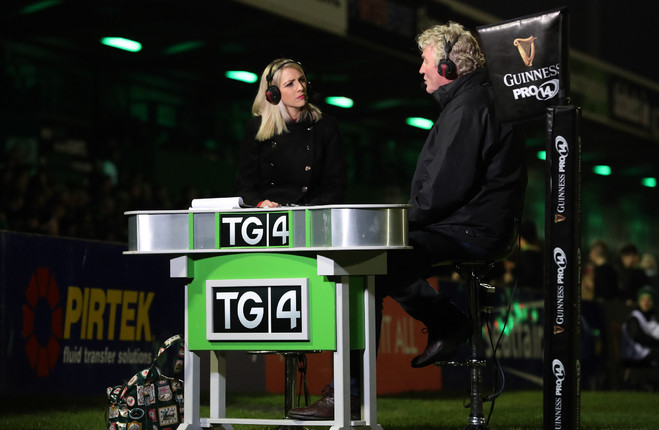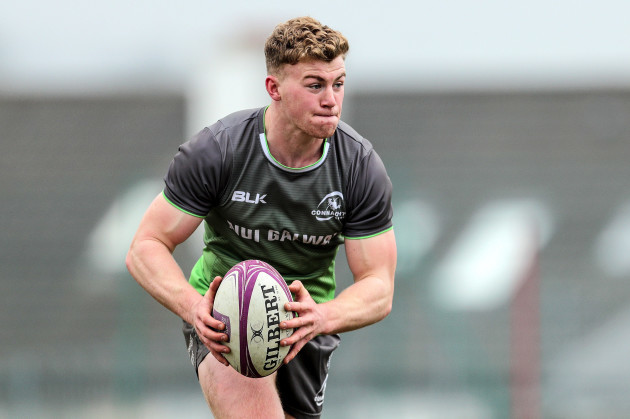POET, AUTHOR, JOURNALIST and columnist Brendán O hEithir managed to squeeze a bit of Irish-language radio commentary on rugby into his varied life, and it endures as one of the few things he wasn’t particularly good at.
It is in his seminal GAA book Over The Bar that he records his brief turn calling rugby, while the GAA was in the throes of its ban on foreign sports and the Irish language was similarly reticent to embrace these alien games.
O hEithir wrote of the “challenge to find simple forms of speech to describe any activity which was neither discussed nor written about in Irish”, and when he saw what he perceived to be the feeble response of the Irish team to Noel Murphy’s being knocked out by Wales’ Brian Price, he could only articulate it through the prism of what he imagined would happen on a GAA field.
“The Buffers Alley hurlers”, wrote O’hEithir, would have “hurled the jock-straps off those Welsh hoors all the way to Holyhead.”
Goodness knows how he might struggle with the game of today, given the Buffers Alley of the 1960s presumably hurled without the provision for a HIA.
The explosion of interest in the tactical nuances of the game, along with the ceaseless tweaking of its rules has meant the language has to keep pace with the vocabulary of a sport that is forever evolving.
“Definitely”, says DCU’s Dr Gearóid Ó Cleircín when asked if he feels that there has been a major change in how we talk about the sport.
“I often see new expressions coming in, especially in relation to tactics and sports science. The discourse seems very tactical now.”
Eoghan Ó Neachtain, a commentator on TG4′s Rugbaí Beo, agrees. “It reflects society. Vocabularies change, new things come in and we talk about them, and sport is very pervasive now.
“The rules of the game are constantly evolving so the language is constantly evolving, and we have to be cognisant of that.”
TG4 have faced these challenges since they started showing the sport.
Their first rugby broadcast was five months after they first went on air – the Leinster Schools’ Cup final Terenure and Clongowes on St Patrick’s Day, 1997.
While a basic glossary of the sport’s terms had been developed by Fóras Teanga by that stage, the broadcaster faced a challenge in adapting them for the frenetic pace of a live broadcast.
“There had never been an Irish-language TV station”, remembers Garry Mac Donncha, who landed the commentary gig for that maiden broadcast.
The minor match before the All-Ireland final was as Gaeilge, so that was the only live sport you’d really see as Gaeilge on TV. Raidió na Gaeltachta was mostly focused on GAA and did the odd rugby match, but it wasn’t on my radar back then. So it was almost like learning a new language for me. I’m a fluent Irish speaker so I could describe the flow of a game, but there were words like úd I’d never used before.
“With the help of colleagues at Rádio na Gaeltachta, they passed on some terminology. I remember sitting with colleagues in an office in RTÉ – it was an RTÉ production for TnaG – saying, ‘Right, what will we call ‘offside’, or ‘in from the side?’
“We were creating a new terminology and while it has been tinkered with since, it has more or less persisted.”
Not that he is planning to call in royalties anytime soon.
“I’m not claiming copyright on anything! It was my first commentary gig. Gaelic games and soccer were my background.
“I was a big rugby fan but there had never been the terminology in Irish, so while I always hoped that I would do commentary, I never imagined my first one would be rugby. It was exciting sitting around, trying to create a phraseology to use.
“I do remember having a laugh over ‘Dhíol sé amadán‘, for ‘He sold a dummy’, but we decided we couldn’t actually use it.”
The game’s evolving vocabulary was standardised beyond the TG4 sports department in 2012, when the National Terminology Database got together to update the language’s sporting dictionary.
Ó Cleircín is a member of the terminology committee involved in the project.
“We looked at around 300 key concepts in rugby. If there wasn’t an existing term, we proposed a new one. The committee usually works on an ad hoc basis, on stuff that comes in from translators, government departments or members of the public.
“The only really systematic translation of rugby took place in 2012, with the sports dictionary.”
How do they hold up today?
“I don’t doubt that the rugby terms we approved seven years ago – while some are out of date – the majority of them are fine. There have definitely been a number of new expressions coming into rugby in the last few years due to rule changes that wouldn’t have been translated before.”
Nonetheless, new phrases emerge every year, so ahead of each new season, the TG4 staff come together with an Irish-language expert to decide on phraseology and to standardise its use across the range of dialects heard on the station.
“You have to evolve your language to be able to say it in a soundbite”, says Ó’Neachtain.
“You can’t talk for half an hour about something going on at the scrum, half an hour after the scrum is gone…okay maybe the scrum is a bad example given how long they seem to go on for at the moment!”
‘Wheeling the scrum’ has been updated by the TG4 commentators since – they use ‘casadh na clibirte’ – and other phrases to have been updated include HIA (measúnú ar ghortú cinn) and handling errors (botúin láimhseáil).
What you won’t find updated is the highly technical jargon that has stealthily invaded some English-language coverage of the sport: on the latch, pendulum defence, green zone, corridors of power, etc.
“In fairness, if you listen to commentators, they aren’t using those phrases as it would be alien to people listening”, says Ó Neachtain.
“Okay, we all get the drift defence now, but this type of over-elaboration, people don’t use.”
Mac Donncha agrees.
“We are cognisant of the fact that a lot of the people watching Rugbaí Beo aren’t necessarily fluent in Irish. We try not to make the language too complicated.
“What we try not to do is direct translations, that’s not a healthy thing for the Irish language – not that we are all militant Gaelgoirs.
“We try to be creative with phrases, to give a meaning that people with just a grasp of Irish will understand.
“Some of this new stuff – sometimes I ask, ‘What are they on about?’
Following on from the successful Schools’ Cup experiment, TG4 picked up the rights for the artist then known as the Celtic League back in 2001.
They have held them since, bar a five-year hiatus from 2004 to 2009 during which Setanta picked up the rights.
During that time, the sport has taken root in the language’s main constituency, with the formation of An Ghaeltacht Rugbaí club.
The club makes use of the glossary of terms that has been honed by TG4, and it has produced the highly-regarded Colm de Buitléar, who made his senior debut for Connacht earlier this year.
Connacht will be represented at this evening’s Pro14 final in transmission alone, given the game is being shown live on TG4.
Instead the Irish interest is Leinster, who will hoping to avoid another encounter with a relatively unfamiliar phrase – defeat.


